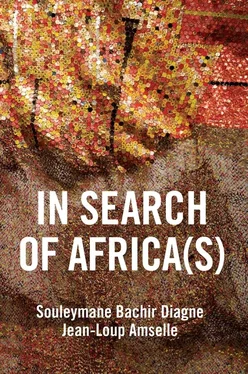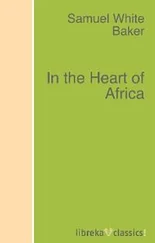An anthropologist by training, Amselle in fact broke with the rigid categorizations of his discipline (race and ethnicity as fixed units), while at the same time refusing to analyse social and cultural phenomena on a strictly local scale. From his earliest works, Les Migrations africaines ( The African Migrations ) 26and Les Négociants de la savane ( The Traders of the Savannah ) 27up to his recent studies Psychotropiques ( Psychotropics ) 28and Islams africains: la préférence soufie ( African Islams: The Sufi Preference ), 29he has constantly probed the deployment of identities within extensive networks, including commercial systems that are spreading across the world in the contemporary process of globalization.
From an epistemological point of view, his approach remains mainly genealogical, in other words, quick to spot significant paradigm shifts, the most important of which is certainly for him ‘the defeat of the continuum’. 30The various phases of European colonial expansion established a range of oppositional, hierarchical and binary schemas in the relations between the West and the rest of the world. These ethnological or raciological patterns then broke the great chain of entanglements, interweavings and concatenations that have always linked Europeans to other societies, cultures or epistemes.
This ‘defeat of the continuum’ subsequently led to two major upheavals. Firstly, the cultures that were brought into contact with each other slipped into relations of gradual differentiation, or ‘schismogenesis’, to use a term taken from the anthropologist Gregory Bateson. 31They thus gradually became specialized in attitudes that were sometimes symmetrical – the notorious mimeticism and all the games with mirrors and reflections so often criticized by Amselle – and sometimes complementary or mutually adapted (such as the relations of domination–submission, voyeurism–exhibitionism, assistance–dependence, highlighted by Bateson).
These various feedback processes not only favoured the triumph of ‘ethnological reason’ on both sides of the relationship, but they also changed the dominant axis of identity constructions. For a long time, in fact, such constructions favoured horizontality by integrating themselves – in a dialogic, even polemical, way – into networks or ‘chains of societies’ involving a series of lateral branchings or connections. In this context, the only verticalities stemmed, on the one hand, from the logics of empire or the distinction between ‘encompassed’ and ‘encompassing’ societies, and, on the other hand, from the inevitable class struggles in each society, struggles that could obviously take a racial turn, as in the slave societies of the New World.
But after the end of colonial empires and the fall of the Berlin Wall, and ‘in the post-Cold War situation’, ‘vertical clashes’, according to Amselle, were soon reconfigured: the historicist and Marxist paradigm of class struggle was abandoned, even though this struggle stemmed directly from ‘race struggle’. The vertical paradigm was reinvigorated and decisively assumed greater importance than lateral branchings or connections, or ‘horizontal conflicts’. From the old colonial relations we were left with ‘vertical, ethnic identities’ cutting across, fragmenting and now partitioning social bodies and intellectual, literary and artistic fields into so many ‘slices’ and ‘vertical gashes’. Today, we are witnessing a ‘return of race’, as well as a growing ethnicization of cultural relations and social conflicts, as Amselle has abundantly demonstrated in recent studies such as L’Ethnicisation de la France ( The Ethnicization of France ) 32and Les Nouveaux Rouges–Bruns ( The New Extremists across Right and Left ). 33
The highlighting of these variable geometries of identity – plotted against the two axes of verticality and horizontality, and their potential historical reversals – also plays a part in another model, one that is equally important in Amselle’s epistemology: this is the geographical model and its often worldwide scale. Amselle, in fact, has never stopped practising a globe-trotting anthropology on multi-located sites, from Europe to the Africas and the Americas, and from India to Peru via Mali. The anthropologist thus links disparate worlds, and he pursues ‘channels’ and ‘networks’ at various points of the planet; his studies can therefore be read as extensive geopolitical coordinate systems.
A third model structures these works, based on a socio-linguistics, and more specifically a pragmatics, which constantly insists on the shifting nature of referents and on the fundamentally performative character of ethnonyms. This socio-linguistic framework moved centre stage after Branchements (2001), which focused on ‘particularist derivations of signifieds in relation to a network of planetary signifiers’, 34while, following on from this, other studies (of contemporary African art, postcolonialism and new forms of primitivism) have tracked the various processes of ‘relexification’ of artefacts and concepts, and all the phenomena of ‘creolization’ or ‘code-switching’ which characterize contemporary artistic, literary and intellectual practices.
These three models – historical and dynamic, geometric and geographical, socio-linguistic and pragmatic – ultimately lie within the same problematic: it is a matter of thinking first and foremost about the relations of force within societies, as well as between different societies, languages and cultures. The latter, in fact, as Amselle tells us,
are not situated next to each other like Leibnizian monads without doors or windows: they take up their place in a moving whole that is itself a structured field of relations. […] The definition of a given culture is actually the result of an intercultural relation of force: the spatially dominant culture has the power to assign to other cultures their own place in the system, turning the latter into their subjected or determined identities. […] The system is not static, however: certain cultures that were once subjected become dominant while others, like stars, are born and then vanish. 35
This issue of ‘relations of force’ is certainly Amselle’s major concern, and the keystone of his whole oeuvre. It is a theme he also explores in cultural and linguistic relations as well as in artistic, literary and intellectual productions.
From one dialogue to another
So it is on the basis of their respective paths, but also of a certain number of shared concerns, that Diagne and Amselle have here followed a dialogue already initiated in several studies and public encounters. 36They tackle many themes: the question of universalism; the concepts of race, culture and identity; the role of languages in philosophical practice and philosophy in different cultural areas; the various conceptions of Islam, especially in West Africa; and finally the outlines of an Africa which can be thought of at the same time as singular and as plural. Each thinker looks back at his recent ideas on these themes, comparing and contrasting them with those of his interlocutor.
However, it is important to warn the reader that it is not just two styles of thought, but also two opposite modes of address, that are coming into play here. Faithful to a certain polemical temperament and to a taste for straight talking that sometimes dispenses with oratorical precautions, Amselle opens the various debates by trying each time to drive his opponent into a corner and, in particular, to expose the essentialist, culturalist and differentialist logics that might underlie certain critical propositions in postcolonial and decolonial thinking on the relations between Africa and the West, language and thought, Islam and philosophy, culture and politics. The anthropologist thus adopts a resolutely chivalrous posture – in the sense that he enjoys crossing swords with an opponent.
Читать дальше












